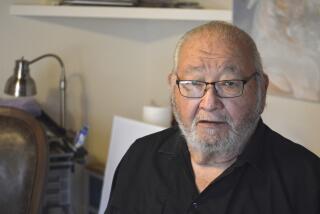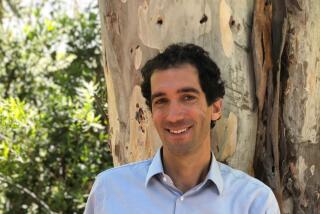MILTON IN AMERICA.<i> By Peter Ackroyd</i> .<i> W. W. Norton: 307 pp., $22.95</i> : EDEN RENEWED: The Public and Private Life of John Milton.<i> By Peter Levi</i> .<i> St. Martin’s Press: 336 pp., $27.95</i>
- Share via
In 1636, John Winthrop of the Massachusetts Bay Co., a godly gentleman who had immigrated to New England with his family, described in his diary how members of his community had taken violent retaliatory action against an entire local tribe of Native Americans, whom they believed to have harbored a murderer:
“When they had spent two days searching the island and could not find the Indians, they burnt their wigwams and all their mats and some corn, and staved 7 canoes and departed. They could not tell what men they killed, but some were wounded and carried away by their fellows. The 14 of September they came all safe back to Boston, which was a marvellous providence of God that not a hair fell from the head of any of them.”
As he chronicles the settlers’ early years in Massachusetts, Winthrop never falters in his conviction that right and wrong can be judged with absolute clarity by the godly. Reassured by God’s providence, the Puritan community confidently exacts vengeance on the tribe, just as it imposes the most punitive of moral systems in its own internal affairs. Beatings and branding for petty crimes, hangings and burnings for serious offenses, from rape to supposed witchcraft, are part of everyday life in New England. Savage punishments are accepted with the same resigned acceptance as are the tragic accidents that occur with regularity in this fundamentally hostile land: Both are “God’s will,” inevitable.
Here is an Eden presided over by a vengeful and unkind God. From our own indecisive and anxious vantage point at the end of the 20th century, the absolute moral certainty with which the newly arrived inhabitants of Massachusetts operated is both compelling and horrifying.
This world is the setting for Peter Ackroyd’s latest novel, “Milton in America.” Onto these inhospitable shores, in the year 1660, stumbles blind Milton, fleeing the persecution in London that he knows the end of the English Commonwealth and the return of King Charles II will bring. Guided by a London street urchin whom he nicknames Goosequill (because he becomes his scribe and because his hair sticks up on top of his head), Milton, with characteristic obstinacy and determination, sets about rebuilding his shattered life, physically and spiritually, in New England. Between them, Milton and Goosequill chronicle the disastrous events that follow Milton as the ruthlessly uncompromising spokesman for righteousness, Goosequill as the cheerfully compromising and compromised member of the dispossessed, in search of a better life in a new land for himself and his family.
Goosequill’s strategy is to adapt. He sees exotic alternatives to the life in the gutter he lived in London, in Native American life and the supportive communities of ordinary, humble men and women making a fresh start in a new land. Milton pursues his dream of a disciplined, regulated world, the dream that ended in disappointment with the failure of the English Revolution in the decadent Old Country.
Milton--biblical scholar, Latin secretary to Oliver Cromwell, author of a whole series of provocative Puritan pamphlets, composer of the greatest epic poem in the English language, “Paradise Lost”--never went to America. He died in England, withdrawn from public life, in November 1674. So at the most obvious level “Milton in America” is a work of fiction. Ackroyd has perfected this technique in his best-selling novels over the years: Into a meticulously researched historical period and location, he inserts a set of characters who closely resemble figures from the past, then excavates the murky psychological waters between fact and fiction to yield an unsettling reassessment of our eminent forebears.
Ackroyd’s imagined version of the consequences of the collision of Milton’s high-minded ideals with the diversity and muddle of early New World settlement rings uncannily true. That makes “Milton in America” a thought-provoking rather than a great novel. It reconstructs its 17th century setting as painstakingly as an Ackroyd tour-de-force like “Hawksmoor,” but its pace is slow and it lacks the mesmerizing plot. Nevertheless, “Milton in America” gives its reader a lot to think about, particularly if it is set alongside the most recent in a long line of biographies of the real John Milton.
Peter Levi’s “Eden Renewed: The Public and Private Life of John Milton” is (in spite of its subtitle) an old-fashioned literary biography, which attempts to reconcile the poet of genius with the failed political activist. Levi reveals the limitations of his book disarmingly at the end of his preface: “I am sufficiently elderly to have forgotten by now most of my own research but not to have lost a lifetime’s reading of Milton, which has sustained me and continues to do so.” Here then is an author whose attachment to English literature has been shaped by the poetry of Spenser, Shakespeare and Milton, and who sets out to justify the timeless perfection of a poem like “Paradise Lost” for his reader. The connecting thread in Milton’s work is, for Levi, the Latin and English poems that he continued to write, even at the height of his political activity. Indeed, “Eden Renewed” is rather thin on strictly biographical detail, which Levi tends to leave to classic biographers like W. R. Parker (whose monumental two-volume “Life of Milton,” first published in 1968, has just been reissued).
How, Levi asks, could a man who throughout his life had so sensitive and nuanced an ear for English as a poetic language commit himself for decades to the crude clumsiness of political propaganda? Rather easily, one might retort. One of the perennial problems for the literary critic is that we may admire an author’s creative talent without necessarily endorsing his or her fundamental beliefs. Harold Bloom maintains that Milton’s “Paradise Lost” is the greatest poem in the English language, the cornerstone of the Western literary canon. But the greatness of this “embattled, dark work” derives for him from its author’s struggle with beliefs with which we cannot any longer possibly sympathize. In that struggle, Bloom believes, the poem wins. Its “barbaric grandeur” rises above the pettiness of everything Milton held dear.
Ackroyd, however, puts the matter another way and asks: Would a man of Milton’s vivid imagination have been able to stick to his severe doctrinal principles if he had been faced with a real Eden, a rich and unspoiled land, peopled by those who had never known the privilege and elitism he so despised? If he did sacrifice truth and beauty for dogma, would we blame him? And Ackroyd’s perhaps reluctant answer is yes, to both questions. It is of the nature of those who cherish deeply held beliefs that they can turn their backs on nature’s bounty and can withstand the temptations of the flesh, even to self-destruction. But it is not in our nature to forgive such bigotry, even for the sake of art.
In Ackroyd’s story, Milton, unlike his young guide, quite literally cannot see the rich potential in his new surroundings. Nor can he see that the lack of religious tolerance of his own regime in the colony of New Milton mimics horribly the oppression that drove him and his fellow Puritans out of England. He is not entranced with the dress, language and behavior of the Native Americans. He hates the casual acceptance of local rites and practices by his Catholic neighbors. The very thought of intimacy with the Native Americans fills him with self-loathing. Yet, he continues to play the virginal and sings in a “sweet sad voice that was like the sound of the wind in the walls of old ruinous St. Michael’s church,” music that echoes the cadences of the translations of the psalms he dictates daily to his young amanuensis.
In “Milton in America,” it is Milton--dogmatic, unrelenting and unbowed--whose “vision” finally destroys Goosequill’s earthly paradise, who “brings death into the world and all our woe.” Faced with the choice between “godly discipline” and multicultural tolerance, the choice is as clear for Milton as it was for Winthrop: Sonnets and heroic verse might sustain the Old World. Only the ruthlessness of blind faith could build a new one, “hard liberty before the easy yoke of servile pomp.”
More to Read
Sign up for our Book Club newsletter
Get the latest news, events and more from the Los Angeles Times Book Club, and help us get L.A. reading and talking.
You may occasionally receive promotional content from the Los Angeles Times.









